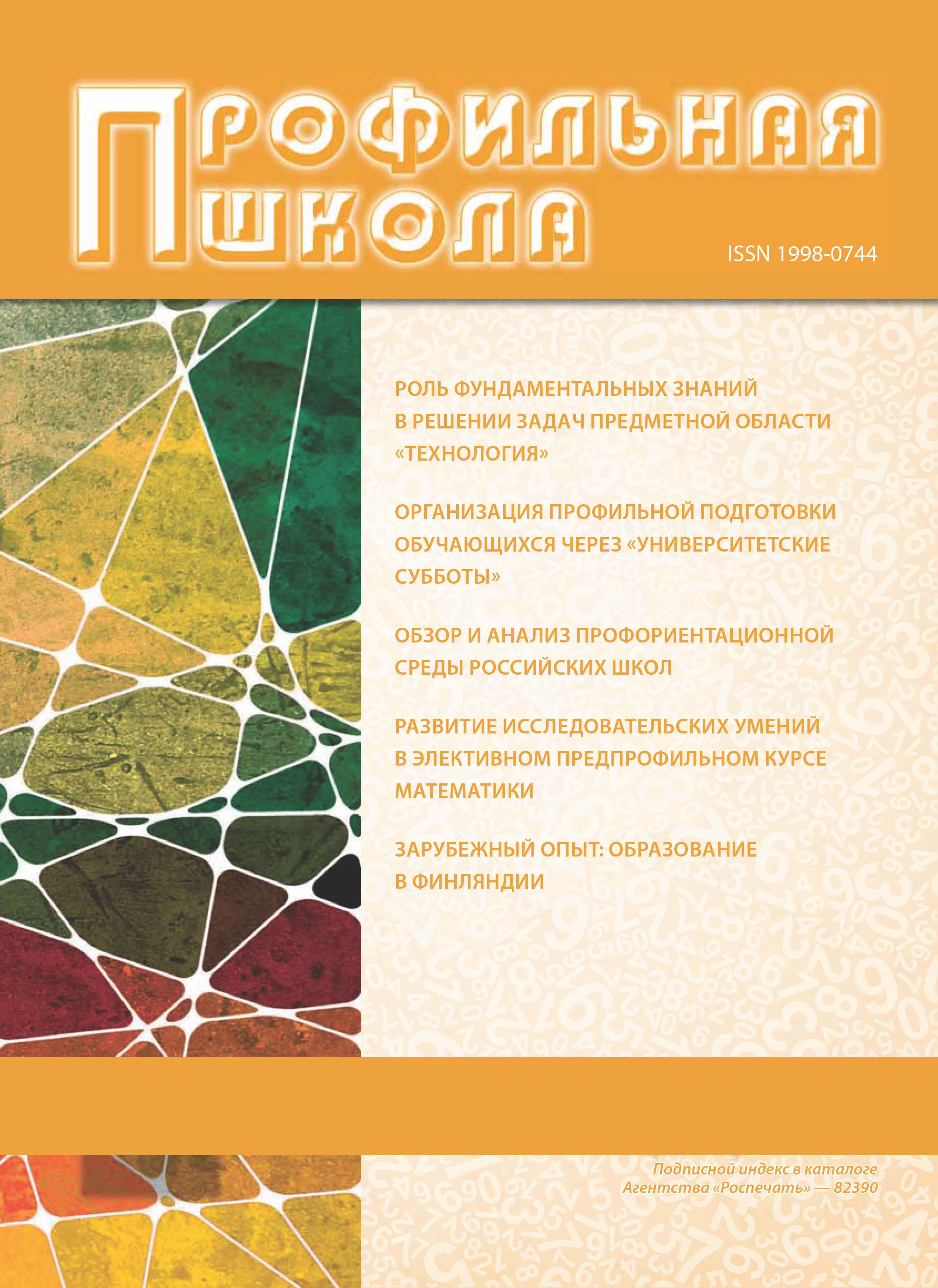The article considers the concepts of level and profile differentiation of content, issues of differentiation of the content of computer science training at the level of education in secondary school. The characteristic of the basic and profile level of computer science in high school is given; the potential of the school course in computer science in the development of thinking, the formation of a worldview and the improvement of the digital skills of a school graduate are revealed. The content of the school course in computer science is described in terms of its compliance with the main areas of the scientific field "Computer Science" and through digital technologies. Examples of the implementation of various options for teaching computer science in high school using the existing educational and methodological support are given.
differentiation of the content by level, differentiation of the content by profile, computer science, high school, basic level of study of computer science, advanced level of study of computer science
1. Abdrahmanova G.I., Kovaleva G.G. Cifrovye navyki naseleniya. NIU VShE, 2017 [Digital skills of the population. NRU HSE, 2017]. Available at: https://issek.hse.ru/data/2017/07/05/1171062511/DE_1_05072017.pdf (accessed 13 January 2020).
2. Bosova L.L. Informatika. 11 klass. Bazovyj uroven' [Informatics. Grade 11. Basic level]. Moscow: BINOM. Laboratoriya znanij Publ., 2016. 256 p.
3. Bosova L.L. Informatika. 10 klass [Informatics. Grade 10]. Moscow: BINOM. Laboratoriya znanij Publ., 2016. 288 p. EDN: https://elibrary.ru/ZISSLS
4. Bosova L.L. Informatika. 10-11 klassy. Bazovyj uroven' [Informatics. 10-11 grades. Basic level]. Moscow: BINOM. Laboratoriya znanij Publ., 2016. 256 p.
5. Bosova L.L. O bazovom urovne izucheniya informatiki v starshej shkole [On the basic level of studying computer science in high school]. Sovremennye informacionnye tekhnologii i IT-obrazovanie. Sbornik nauchnyh trudov II Mezhdunarodnoj nauchnoj konferencii i XII Mezhdunarodnoj nauchno-prakticheskoj konferencii [Modern information technologies and IT education. Collection of scientific papers of the II International Scientific Conference and the XII International Scientific and Practical Conference]. 2017, pp. 290-296. EDN: https://elibrary.ru/YTGYSW
6. Bosova L.L. Sovremennye tendencii razvitiya shkol'noj informatiki v Rossii i za rubezhom [Modern trends in the development of school informatics in Russia and abroad]. Informatika i obrazovanie [Informatics and education]. 2019, I. 1 (300), pp. 22-32. DOI: https://doi.org/10.32517/0234-0453-2019-34-1-22-32; EDN: https://elibrary.ru/VVXQRG
7. Zaharova T.B. Profil'naya differenciaciya obucheniya informatike na starshej stupeni shkoly [Profile differentiation of teaching computer science at the senior stage of school]. Moscow, 1997.
8. Kalinin I.A. Informatika. Uglublennyj uroven' : zadachnik-praktikum dlya 10-11 klassov [Informatics. Advanced level: a problem book for 10-11 grades]. Moscow: BINOM. Laboratoriya znanij Publ., 2015. 248 p. EDN: https://elibrary.ru/GJCUXL
9. Kalinin I.A., Samylkina N.N. Informatika. Uglublennyj uroven'. 10 klass [Informatics. Advanced level. Grade 10]. Moscow: BINOM. Laboratoriya znanij Publ., 2013.
10. Kalinin I.A., Samylkina N.N. Informatika. Uglublennyj uroven'. 11 klass [Informatics. Advanced level. Grade 11]. Moscow: BINOM. Laboratoriya znanij Publ., 2013.
11. Kerzon P. Vychislitel'noe myshlenie: Novyj sposob reshat' slozhnye zadachi [Computational thinking: A new way to solve complex problems]. Moscow: Al'pina Pablisher Publ., 2018. 266 p.
12. Kuznecov A.A. Osnovy obshchej teorii i metodiki obucheniya informatike [Fundamentals of General Theory and Methods of Teaching Informatics]. Moscow, :BINOM. Laboratoriya znanij Publ., 2014. 207 p.
13. Lednev V.S. Sistemnyj podhod v pedagogike [A systematic approach in pedagogy]. Metafizika [Metaphysics]. 2014, I. 4 (14), pp. 39-51. EDN: https://elibrary.ru/TMNCNZ
14. Obuchenie cifrovym navykam: modeli cifrovyh kompetencij [Teaching digital skills: digital competency models]. http://obzory.hr-media.ru/cifrovye_navyki_sotrudnika (accessed 13 January 2020).
15. Pasport nacional'noj programmy \"Cifrovaya ekonomika Rossijskoj federacii\" [Passport of the national program "Digital Economy of the Russian Federation"]. oficial'nyj sajt Pravitel'stva Rossijskoj Federacii [official website of the Government of the Russian Federation]. Available at: http://static.government.ru/media/files/urKHm0gTPPnzJlaKw3M5cNLo6gczMkPF.pdf (accessed 13 January 2020).
16. Primernaya osnovnaya obrazovatel'naya programma srednego obshchego obrazovaniya [Approximate basic educational program of secondary general education]. Available at: https://fgosreestr.ru/ (accessed 13 January 2020).
17. Semenova Z.V., Razvitie metodicheskoj sistemy uglublennogo obucheniya informatike v usloviyah modernizacii shkol'nogo obrazovaniya [Development of a methodical system of advanced training in informatics in the context of modernization of school education]. Omsk; Poligraficheskij centr Publ., 2003. 154 p. EDN: https://elibrary.ru/WGAGFP
18. Prikaz Ministerstva obrazovaniya i nauki RF ot 17 maya 2012 g. N 413 "Ob utverzhdenii federal'nogo gosudarstvennogo obrazovatel'nogo standarta srednego obshchego obrazovaniya" [Order of the Ministry of Education and Science of the Russian Federation of May 17, 2012 N 413 "On approval of the federal state educational standard of secondary general education"]. Available at: https://base.garant.ru/70188902/ (accessed 13 January 2020).
19. Federal'nyj zakon ot 29 dekabrya 2012 g. №273-FZ \"Ob obrazovanii v Rossijskoj Federacii\" [Federal Law of December 29, 2012 No. 273-FZ "On Education in the Russian Federation"]. Available at: https://base.garant.ru/70291362/ (accessed 13 January 2020).
20. Henner E.K. Vychislitel'noe myshlenie [Computational thinking]. Obrazovanie i nauka [Education and science]. 2016, I. 2 (131). pp. 18-32. DOI: https://doi.org/10.17853/1994-5639-2016-2-18-33; EDN: https://elibrary.ru/VOTUAF






